10 frozen dinners that are actually good for you
These delicious, microwavable meals are 500 calories or less.

When you don't have time to whip up a healthy, home-cooked meal, there’s no need to resort to takeout. There are healthy mealtime options hiding right in your supermarket’s frozen food aisle; you just need to know which meals to look for.
Aja Stokes, a registered dietitian with Fairview Park Hospital in Dublin, Georgia, reveals some of the best frozen dinner options. Get the inside scoop on which wholesome eats to look for and what to avoid.
“You want to look for meals that incorporate whole grains and a lean meat, like chicken, turkey, fish or other seafood,” Stokes says. “Those food items tend to be lower in calories, provide you with a lot of vitamins and minerals and contain fiber,” says Stokes.
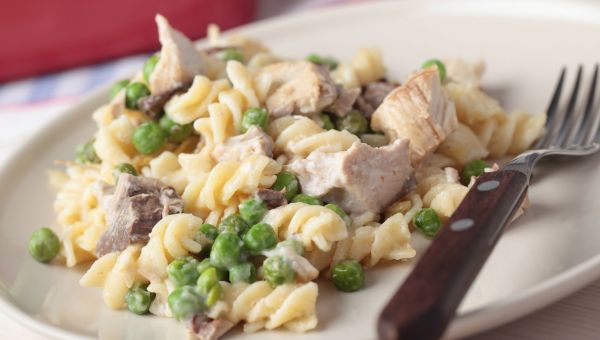
Smart Ones: Tuna Noodle Casserole
Seafood lovers, rejoice! This dish combines protein-rich tuna, nutrient-packed peas and tasty breadcrumbs, while meeting the requirements for a healthy, well-balanced meal. Bonus: it only contains 250 calories.
As a general rule, healthy meals should contain between 300 and 500 calories, Stokes says. Most single-serve, diet-friendly frozen dinner options sold in the grocery store fall within, if not below, this range.
While calories should be kept in mind, consider the other ingredients in your frozen meals. This meal falls under the daily recommendations for fat, sodium and sugar, containing three grams of fat, 560 milligrams of sodium and four grams of sugar. Plus, it contains five grams of fiber and a whopping 13 grams of protein.

Smart Ones: Lemon Herb Chicken Piccata
This meal is kind to your taste buds and your waistline: It contains chicken breast with mixed veggies, drizzled with lemon and herb sauce for only 210 calories.
This meal contains fewer than three grams of fat, just three grams of sugar, 16 grams of protein, three grams of fiber and only 370 milligrams of sodium per serving.
Calories get all the attention, but the main problem with frozen meals is the salt content, Stokes says. “A lot of these TV dinners are loaded with salt to help preserve the food.”
Salt may taste good, and your body does need some sodium to function properly, but the effects of excess salt in your diet can seriously hurt your heart health. For many, salt contributes to elevated blood pressure levels, a risk factor for heart disease. So, how much is too much? The American Heart Association and Food and Drug Administration recommend eating no more than about 2,300 milligrams of sodium per day.
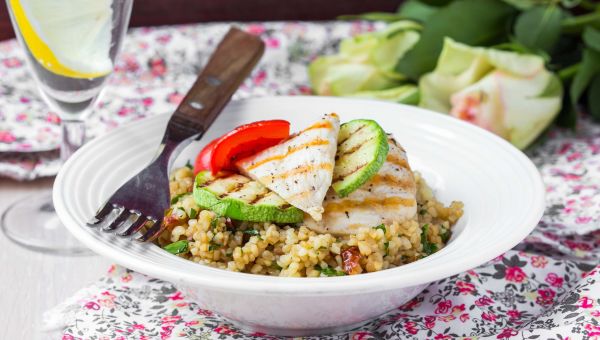
SmartMade: White Wine Chicken and Couscous
If you’re looking to keep your sodium intake within the recommended range, Stokes recommends choosing frozen meals that contain 600 milligrams of sodium or less. A good choice? This chicken and couscous meal, complete with zucchini, eggplant and onions, contains 500 milligrams of sodium.
With just 190 calories and 16 grams of filling protein, this meal is ideal for those looking to shed a few pounds. Plus, it contains only five grams of sugar and fewer than three grams of fat.

SmartMade: Mexican-Style Chicken Bowl
This fiesta-inspired meal gets a gold star for its fiber content. A single meal contains six grams of fiber, or nearly one-fourth of the daily recommendation.
The American Heart Association recommends consuming about 25 grams of fiber per day, but most Americans consume only half that amount. Why is proper fiber intake important? Fiber helps lower cholesterol levels, control blood sugar, maintain healthy bowels, reduce your risk of diabetes and more.
Stokes recommends choosing veggie-packed frozen meals with at least five grams of fiber. “Look for meals that include at least one serving of vegetables,” she says. “They’ll fill you up, so you'll eat less, but feel satisfied,” she concludes.
In addition to fiber, this frozen meal contains just 260 calories, 530 milligrams of sodium, five grams of fat, six grams of sugar and a whopping 21 grams of protein.

Healthy Choice Café Steamers: Homestyle Chicken and Potatoes
The American Heart Association recommends limiting your daily intake of added sugars to about 25 grams for women and about 36 grams for men. The government-issued Dietary Guidelines for Americans, however, recommends consuming no more than 10 percent of your daily calories in the form of added sugars. For someone with a 2,000 calorie diet, that’s about 50 grams of added sugar a day. The average American exceeds this by more than 30 grams.
Added sugars increase your risk of weight gain, obesity and weight-related compilations, like heart disease.
Some frozen meals contain as many as 35 grams of sugar, so choose dishes like this combination of chicken, potatoes and vegetables. It contains one gram of sugar, fewer than five grams of fat, 590 milligrams of sodium, four grams of fiber and 16 grams of protein—for only 200 calories.
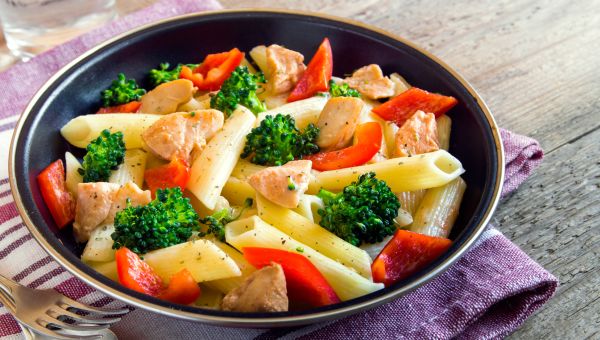
Healthy Choice Simply Steamers: Grilled Basil Chicken
If you’re looking for another low-sugar option, reach for this blend of chicken, pasta and veggies with lemon and basil sauce. Dig in without worry—it contains only three grams of sugar.
This dinner is ideal for dieters, clocking in at 240 calories, five grams of fat, 550 milligrams of sodium, five grams of fiber and 17 grams of protein.
Getting enough protein is vital to proper body function. Research also suggests protein helps keep you full, which can prevent noshing on unhealthy eats throughout the day.
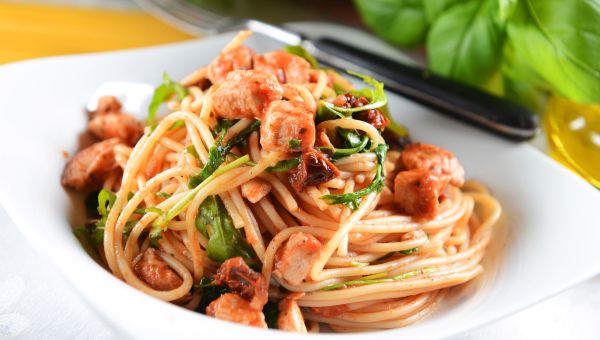
Healthy Choice Café Steamers: Chicken Linguini with Red Pepper Alfredo
This pasta dish blends noodles, chicken and broccoli with a rich, red pepper sauce, and contains 21 grams of protein.
How much protein should you really look for in a meal? The right amount of protein varies from person to person, depending on age, weight, height, gender and activity level. The Institute of Medicine advises adults to consume about eight grams of protein for every 20 pounds of body weight.
This dinner hits other healthy eating marks, too. It contains 250 calories, 520 milligrams of sodium, five grams of fiber, three grams of sugar and six grams of fat.
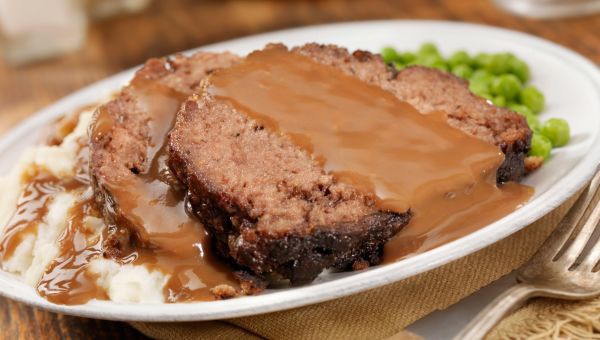
Lean Cuisine: Meatloaf and Mashed Potatoes
Satisfy your cravings for comfort food with this diet-friendly dinner. Despite the taste of this seemingly indulgent dish, it meets all the requirements for a healthy frozen dinner.
This dinner contains 230 calories, 520 milligrams of sodium, three grams of fiber, three grams of sugar and six grams of total fat, essential to the health of your brain, skin and hair and absorption of necessary vitamins.
While the body does need some fats, not all fats are created equal. Unsaturated fats, like olive and canola oil, promote growth of the body’s cells, help lower cholesterol levels and aid in maintenance of healthy blood sugar levels. Others, like trans and saturated fats, do more harm than good. Too much saturated fat can lead to an increase in unhealthy cholesterol and up your risk of heart disease and stroke. Fortunately, this plate of southern comfort contains just three grams of saturated fat.

Lean Cuisine: Steak Portabella
Why swap your meat-based dinner with a veggie-friendly dish? Vegetables are packed with vitamins and minerals, are high in fiber and are much lower in saturated fats than some meat products. This 160-calorie meal contains 15 grams of lean protein, three grams of fiber, 610 milligrams of sodium, three grams of sugar and three grams of fat.
We know our bodies need fat to function properly, but excess consumption of trans and saturated fats can up your risk of heart disease. The American Heart Association recommends limiting saturated fat to less than six percent of your daily calories. Trans fats should be avoided completely.
Keep these limits in mind while you grocery shop. “Make sure the fat content doesn't exceed 18 grams of total fat,” Stokes says. “Look for food items that are low in saturated fats, and contain 4 grams or less,” she adds.
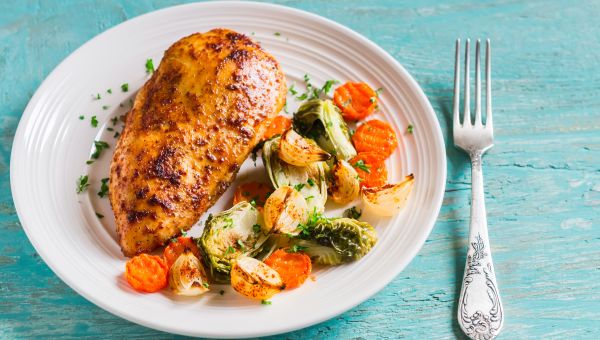
Lean Cuisine: Herb Roasted Chicken
This frozen dinner has all the makings of a well-balanced meal: lean protein, colorful veggies and a healthy starch all for 170 calories. Plus, it has four grams of fat, three grams of fiber, 520 milligrams of sodium, four grams of sugar and 16 grams of protein.
Although these ten meals are some of the healthiest frozen meals you can buy, we don’t all have the same palettes. So, the next time you’re in the market for a frozen meal, remember to look for:
- Between 300 and 500 calories
- Fewer than 18 grams of total fat and four grams of saturated fat
- Less than 600 milligrams of sodium
- At least five grams of fiber
- No more than 25 grams of sugar for women or 36 grams for men daily
- Eight grams of protein for every 20 pounds of your body weight
More On


video

article

slideshow


video


video
